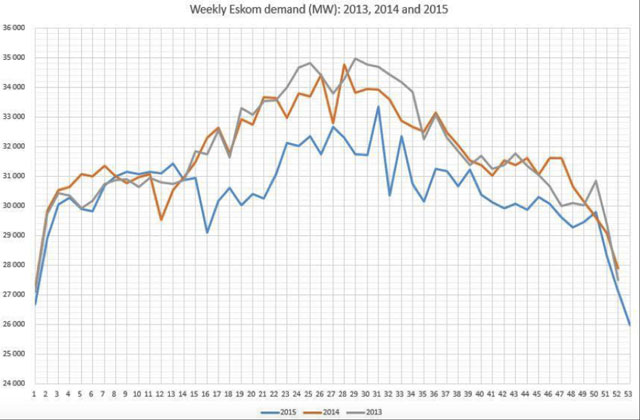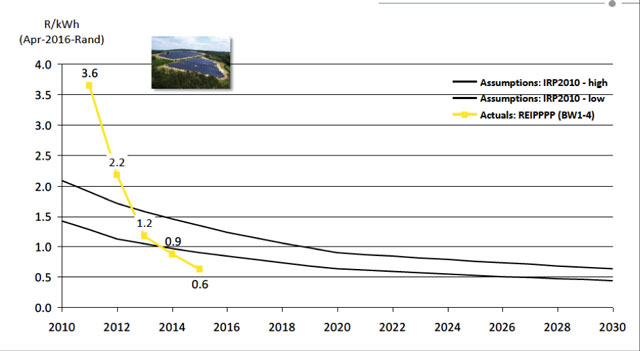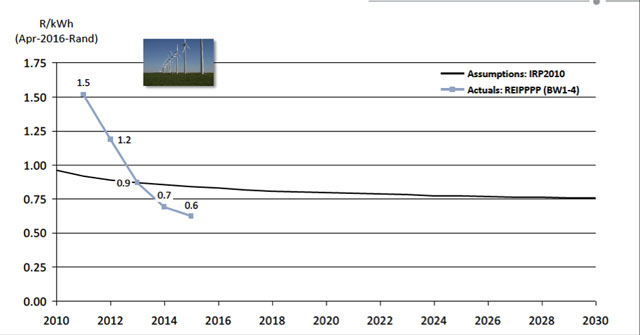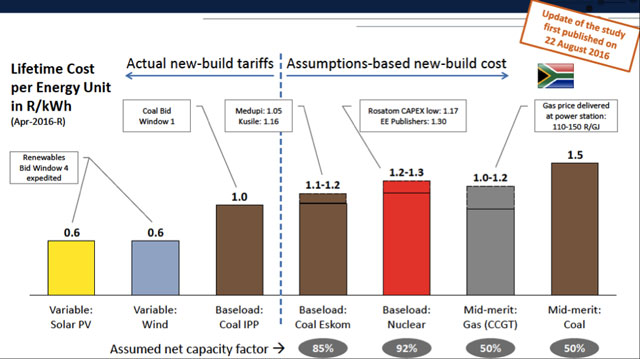
Eskom CEO Brian Molefe is not running the country’s largest utility, he is running a propaganda campaign.
That was the opinion of Chris Yelland from EE Publishers, who was speaking at the Life After Coal seminar held in Cape Town on Monday.
Yelland revealed that Eskom has, since May this year, neglected to publish information it used to routinely make available via its website — for years. This included basic information such as the utility’s weekly energy availability capacity and electricity demand. He has since reverted to the courts via Public Access to Information Act (PAIA) requests and other legal applications, to get Eskom to publish the information.
But while the utility has been increasingly elusive in this regard, Molefe and other executives including Matshela Koko (group executive for generation) have been intensifying the propaganda campaign with several inaccurate and misleading public statements that make the public question their motives.
One of the narratives Molefe and Co have attempted to propagate is the fact that South Africa needs new capacity — in addition to the outstanding capacity that is currently being installed at Medupi and Kusile.
The facts plainly indicate the country is consuming (and Eskom is supplying) less electricity than it was 10 years ago and, despite the economic growth the country has enjoyed since then, the trend remains downward. Demand for Eskom’s power has declined so sharply that it is now far below government’s low-demand scenario, as published in the last official Integrated Resource Plan (IRP) of 2010. See the weekly Eskom demand graph below:

Despite being legislated to do so by the National Energy Act, the department of energy has not updated the 2010 IRP. So, we have no idea whether the government views a lower-demand scenario in the next 10 years as a real possibility. But in its absence, it conveniently allows Eskom to push the need for nuclear.
The second falsehood Eskom executives have peddled is that the cost of renewables makes them too expensive to implement in relation to other forms of energy, such as coal and nuclear.
This is patently false.
The only certainty in South Africa’s energy mix is that the cost of renewable energy is falling faster than anyone expected.
South Africa’s renewable energy sector has been tagged as a “follower” by the head of the CSIR’s Energy Centre, Tobias Bischof-Niemz. “As a follower, we are benefitting from one of the most successful subsidy programmes in the world,” Bischof-Niemz told participants at the Life After Coal seminar. “The subsidies provided by the governments of the US, EU and Japan (collectively referred to as “the leaders”) did exactly what they intended to do — they lowered the cost of renewable energy to the point where they are competitive with other forms of energy.”
This has translated into a massive benefit for successive users of renewable energy, including South Africa. The cost of supplying energy from solar photovoltaic (PV) panels and wind has fallen much faster over each successive bid window than the government anticipated through the 2010 IRP.

As can be seen from the above graph, the cost of PV is now approaching what government anticipated the price reaching only in approximately 2022.

It’s wind in particular that remains a great untapped source of energy in South Africa, according to Bischof-Niemz. One of the criticisms levelled at PV is that it cannot supply base-load power, because the sun only shines during the day. This is not the case for wind.
A joint study commissioned by the CSIR, Eskom, the South African National Energy Development Institute and Fraunhofer IWES — using data over a five-year period (2009 to 2013) for defined turbine types — revealed that South Africa could achieve wind capacity factors of 30% almost everywhere in the republic. (By comparison, two countries that have sizeable wind programmes in operation, Spain and Germany, operate on wind capacity factors of 25% and 20% respectively.) “Our conclusion was the potential for economically viable wind farms in South Africa is virtually unlimited.”
While there are significant fluctuations in the energy capture of individual turbines, an optimised placing of 100 different farms across the country would mitigate the volatility and deliver consistent, reliable power into the grid.
The CSIR also reviewed Yelland’s model to ascertain the accuracy of his conclusion that nuclear would supply energy at a levelised cost basis of R1,30/kWh. “We re-engineered his model and we found his numbers to be credible,” says Bischof-Niemz. The numbers (shown in the graph below) do not factor in externalities such as pollution and carbon dioxide emissions into the cost of coal for example.

So, Eskom continues to misinform, misrepresent and restrict information that does not support the narrative it is so desperate to construct. Why? Because it does not serve the narrow interests of the political masters they aim to please.
- This piece was first published on Moneyweb and is used here with permission

